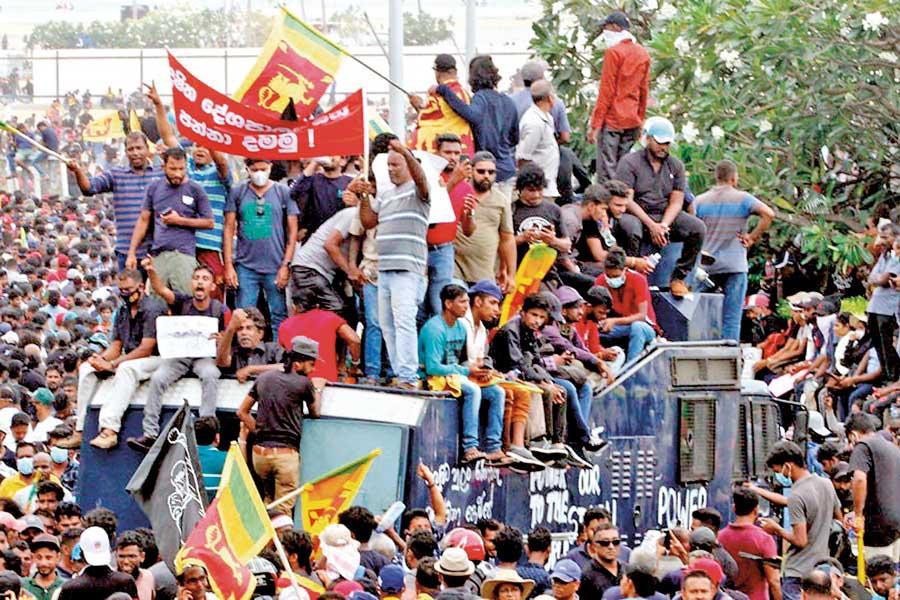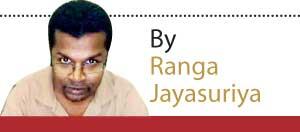Reply To:
Name - Reply Comment
Last Updated : 2024-04-20 00:00:00

Parliament would elect a president on Wednesday (20) for the remainder of the term in office – not for a six-month or a year as demanded by activists
Like every other fallen autocrat, Gotabaya Rajapaksa, the 8th executive president of Sri Lanka fled the country in the dead of the night, a humiliating departure for a leader, whose one of the first things in the office was to amass as many powers as he could at the expense of the other pillars of the state.
the dead of the night, a humiliating departure for a leader, whose one of the first things in the office was to amass as many powers as he could at the expense of the other pillars of the state.
His resignation was the core demand of the millions of Sri Lankans who took to the streets; yet, he left behind a hollowed-out state and institutions that had been distorted as a result of many of Rajapaksa’s tampering with them. They are seriously lacking in legitimacy, yet are tasked with navigating Sri Lanka out of the current political crisis.
Thus Rajapaksa’s departure does not necessarily bring closure to the political crisis. Political institutions have so far proved inadequate and lacking in desire for compromise and consensus that would save Sri Lanka from a new phase of acute political conflagration.
"Political institutions have so far proved inadequate and lacking in desire for compromise and consensus"
Parliament would elect a president on Wednesday (20) for the remainder of the term in office – not for a six-month or a year as demanded by activists. As per the Constitution, a new election for the office of the presidency can be called only after 4 ½ years of the current term has lapsed. That would mean, unless the constitution is amended to allow for early elections- which would then be challenged in the court and might need to be approved with a 2/3 majority in Parliament and a referendum, not the most sensible choice at the moment- whoever gets chosen in Parliament would be the president for next two years.
These two years are momentous and would decide the future of Sri Lanka. The last thing the country needs is that period to be marred by a runaway political crisis, policy uncertainty and civil unrest. Yet, the danger is looming.
As Parliament elects the new president it should do all to avert that.
Parliament is not representative of public opinion
First of all, of all institutions, Parliament is the least representative of the public opinion in the streets. It would be hypocritical for those who argued that Gotabaya Rajapaksa as having exhausted the public mandate, now to say that Parliament of which the Gotabaya loyalists of the Sri Lanka PoduJana Peramuna (SLPP) hold near 2/3 majority is anyway representative of the public mood. There is a major disjuncture between the prevailing public opinion and the current composition of Parliament. Ignoring that, and resorting to a self-serving selected notion of constitutionalism would only feed into public anger that would explode with dramatic and devastating consequences. A constitutional process devoid of public legitimacy is void.
A consensus candidate would have saved the day
Second, given the mismatch between the composition of Parliament and public will, a consensus candidate might have mitigated some of these contradictions.
That is because, barring snap elections, which Sri Lanka is ill afford to hold at the moment, Parliament is still the only place to address the current political vacuum.
Yet, political parties have chosen party and personal interests over consensus. Four candidates- Dullas Alahapperuma, Sajith Premadasa, Ranil Wickremesinghe and Anura Kumara Dissanayake – have thrown the hat into the ring. This has opened up an all-or-nothing contest for the presidency. Ironically, it is a similar maximalist approach to the presidency that ultimately led Gotabaya Rajapaksa unceremoniously vacate the office.
An offer by the civil society groups, including activist monks, to nominate civil society members outside Parliament as a consensus candidate was snubbed. Even a retired politician, say, for instance, Karu Jayasuriya would have been a less divisive pick.
"A new election for the office of the presidency can be called only after 4 ½ years of the current term has lapsed"
Instead, horse trading is currently underway. SLPP General Secretary Sagara Kariyawasam earlier announced that the party would support Ranil Wickremesinghe, the Acting President over Dullas Alahapperuma, the SLPP stalwart. Wickremesinghe’s acumen in handling the crisis so far was cited as the reason, though the economy that is at the standstill due to the fuel crisis might disapprove of such an accolade. A better explanation is the long hand of Basil Rajapaksa. Basil, who earlier tried to flee the country, but was forced to turn back at the airport, maybe more comfortable with the time-tested alliance with Mr Wickremesinghe than the party’s own man Dullas who during the last months of Gotabaya Rajapaksa called for his resignation. (G.L.Peiris, the SLPP Chairman has disputed the statement by Mr Kariyawasam).
In exchange for their vote, Mr Wickremesinghe has offered to rebuild houses of SLPP Parliamentarians that were torched by the protesters in the unrest after the SLPP-affiliated thugs attacked the demonstrators in Galle Face in May.
Seedy behind-the-curtain manoeuvring by the contestants further erodes the legitimacy of the process to elect the president.
Where is the policy?
Third, the presidential contest takes place against the backdrop of zero clarity in the policy choices of the respective candidates. That is in sharp contrast to the calls by the public for major political reforms, including the abolition of the executive presidency and a new constitution- and also must- do economic reforms if Sri Lanka is to qualify for IMF assistance and economic aid by the donor nations.
No candidate has officially announced their position on calls by the protestors in the streets. It is indeed a dangerous proposition for Sri Lankans to put up with another president, who fails to communicate his position on key political and economic matters. It was a previous blunder of electing Gotabaya Rajapaksa, by the constituency who thought he was all-knowing ( he was in fact, staggeringly ignorant ) that landed Sri Lanka in the current crisis in the first place.
It would help the leading contestants to announce their position on each of the key issues. That would generate a degree of legitimacy and coherence to their candidacy and the Parliamentary vote.
Autocratic trend
Fourth, the Acting President Wickremesinghe is treading an autocratic bent that not even Gotabaya Rajapaksa opted to do- or tried and failed. He has announced the state of emergency, which however needs to be approved by Parliament. He threatened to take over the offices occupied by the protesters by the use of the military, which if happened could have led to a blood bath. Instead, the protestors voluntarily vacated most of these places.
Wickremesinghe models himself after J.R.Jayewardene, his grand-uncle, whose autocratic tendencies did more damage to Sri Lanka in terms of loss of life and economic opportunities, than the entire Rajapaksa family, put together did. Dangerously, Wickremesinghe is treading the same path. Security forces commanders should stick to the restraint that was shown until now. They should not have misgivings that Wickremesinghe’s narrative of him being liked by the West would spare them from legal action against potential crimes against humanity if they fire at protestors to save Wickremesinghe.
Wickremesinghe may be a better choice to guide Sri Lanka out of the economic crisis than other candidates, but he lacks legitimacy and his perceived affinity with the Rajapaksas further diminishes his standing.
He should be ready to make major compromises and strike a series of compromises, if he is elected, which is most likely as things stand now, to avoid the country descending into a fresh bout of political crisis.
Last but not least, Sri Lanka cannot expect the donor nations to promise assistance at the proposed donor summit while the police and military are clashing with protestors back home. The new president should strive for political stability and civic peace. That should be the main criteria for the selection.
Follow @RangaJayasuriya
on Twitter

Add comment
Comments will be edited (grammar, spelling and slang) and authorized at the discretion of Daily Mirror online. The website also has the right not to publish selected comments.
Reply To:
Name - Reply Comment
On March 26, a couple arriving from Thailand was arrested with 88 live animal
According to villagers from Naula-Moragolla out of 105 families 80 can afford
Is the situation in Sri Lanka so grim that locals harbour hope that they coul
A recent post on social media revealed that three purple-faced langurs near t